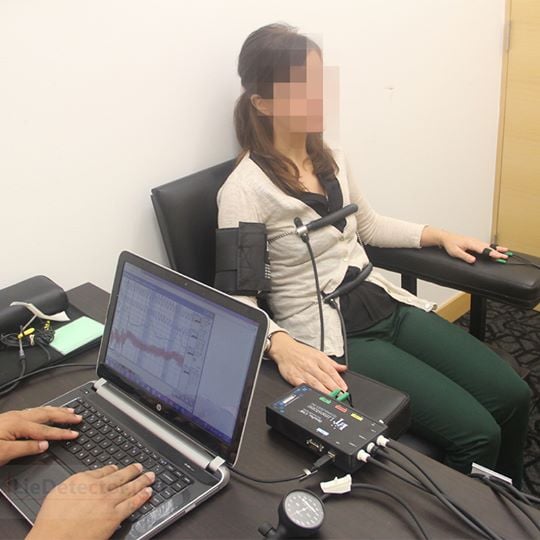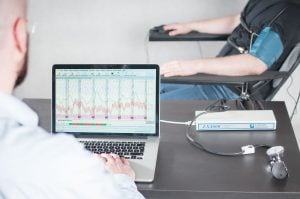With the permission of Christine Greenwood, Managing Director of Lie Detector Test UK we conducted an interview with one of the polygraph examiners, working under the umbrella of her organisation, regarding the accuracy of lie detector tests. Due to the confidentiality of the business the London polygraph examiner cannot be named. Most reputable examiners do not seek celebrity status and their identities are only revealed to those who order lie detector tests.
Fully accredited by the American Polygraph Association (APA), the interviewee is a Home Office approved, highly trained and qualified London polygraph examiner.
How significant is the polygraph examiner in ensuring the accuracy of lie detector tests?
The role of the polygraph examiner is extremely important. From checking the equipment is working correctly to ensuring the test is conducted within the guidelines set by the APA
What are methods do you implement to achieve accurate results?
Primarily it is essential to relax the subject. No matter who sits the test, it is natural to feel some tension. Top security professionals who are often required to take a polygraph examination are as stressed as anyone else. It’s important to empathise with subjects irrespective of the reasons they are taking tests. Whether the test is part of an investigation into child abuse, theft, fraud, paedophilia or murder, the polygraph examiner must de-stress the subject.
The pre-test interview provides the examiner with an opportunity to get to know the subject and to make them feel comfortable. We learn something of their history and develop an understanding of why they are taking a test. The interview is usually at least an hour in duration and will set the format as to how we construct the questions in the polygraph examination.
When the questions are drafted, they are reviewed with the subject before the examination takes place. This allows them to request the questions to be asked in a different way or to be reworded. If they are disturbed by the construction of the question, it will lead to a physiological response automatically.
Do the methods used by polygraph examiners differ?
Depending on where the polygraph examiner studied, their styles may differ but their training compulsorily has to follow the guidelines provided by the APA. These approved methods have been validated in thousands of case studies and ensure the accuracy of lie detector tests.
To what extent does an examiner observe the behaviour and psychological reactions above what the technology is presenting to you?
Much of the test doesn’t involve the technology. The pre-test interview is an information gathering exercise when the subject is not connected to the machine. For example, in a pre-employment screening test, a lot of close ended questions will be discussed. They may include the validity of data on the CV they have submitted, how honest they have been about their past experience and qualifications etc. Then the examiner may throw in a question that is completely divorced from employment such as “Have you paid for the services of a prostitute in the past 3 years?” If the response is delayed slightly or the subject appears uncomfortable, it needs further investigation. An examiner will take note of the reaction without commenting on the answer given. There is nothing wrong with allowing a lie to pass.
So are you saying that someone lying doesn’t concern you?
As a London polygraph examiner, what concerns me is the truth and whether they are telling it or not. However, if a subject chooses to be dishonest in the pre-test interview, that’s up to them. When they are attached to the polygraph it will confirm the lie. We don’t use the pre-test interview as an interrogation. This is a myth that has developed from movies where police surround a suspect when taking a polygraph test. In real life, the suspect takes the test in a calm, controlled and secure environment designed to relax them. It is only after test results indicate deception that any interrogation may take place from the person or organisation that has ordered the test.
Do polygraph examiners make mistakes?
When a test is completed, the data and charts produced from the polygraph have to be analysed and scored. An inexperienced or non-accredited examiner may misinterpret the results. ‘Rookies’ may also fail to notice the unsuitability of a subject to actually take the test. For example, they may be suffering pain from a medical condition or injury. Some may be taking drugs or have drunk alcohol before the polygraph examination. All of these things can affect the results. Sometimes the questions have been constructed improperly. For these reasons and many others, all the polygraph examiners in London and nationwide employed by Lie Detector Test UK must have completed a minimum of one year’s internship and complete ongoing training annually.
The worst error by far is failing to remain impartial. For example, if the test has been ordered as a result of theft in the workplace and a company director tells the examiner that he thinks the subject is culpable, we must not let that influence us. A polygraph examiner has to be objective irrespective of whether the results prove what a client wants or not.
The most likely errors come from amateur and unqualified examiners. They also sometimes come from ‘one man bands’. To err is human and if polygraph examiners work alone, they may sometimes be short of work. Lack of money can lead to the temptation of providing a client with the answers they want to hear. That’s why it is best for examiners to work within an organisation where their analysis is peer reviewed to ensure the accuracy of lie detector tests. Examiners working as part of a team not only are held to the standards of the APA but also to the standards of the organisation that employs them.
How accurate do you think lie detector tests are in the investigation process?
As an investigative tool, when polygraph examinations are conducted properly, I am able to achieve up to 90 percent accuracy.
Do people try to cheat the polygraph very often?
People attempt it regularly. There is plenty of ‘information’ on the Internet regarding how to beat the polygraph. Experience examiners can recognise all the countermeasures and if they are employed, it scores an immediate fail. This means that whoever ordered the test is likely to investigate the subject in a whole lot more depth.
My advice as a highly trained, professional, London polygraph examiner is never to try these methods. They are easily recognisable and the likelihood of a subject being caught out is extremely high.
Lie Detector Test UK polygraph examiners
All examiners working under the umbrella of, employed by or associated with Lie Detector Test UK are APA (American Polygraph Association) accredited and use the latest hardware, software and testing techniques. Founded in 1966 the APA is the premier, most respected association in the polygraph field. It comprises examiners who work in private, public, government and law enforcement sectors. APA accreditation is the most coveted by polygraph examiners due to its established record in upholding the highest standard of ethics, technology, training, methodology and outstanding work in research.


